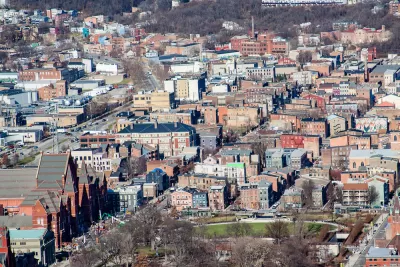For low-income renters, security deposits can be a hurdle they cannot overcome. Cincinnati's “renters’ choice” program aims to help with that challenge by providing alternatives to traditional security deposits.

"In April this year, [Cincinnati] became the first city in the U.S. to require landlords to accept alternatives to a security deposit. Cincinnati’s bold move has been hailed as a way to disrupt a broken system for renters. Other cities and states are now also offering deposit alternatives to make housing more accessible to low-income renters," reports Liza Ramrayka.
The challenge of coming up with the cash for a security deposit is one that many low-income and homeless residents face. During the pandemic, the increase in evictions and job losses in Cincinnati and other cities across the country have made security deposits even more of an issue.
"Cincinnati’s renters’ choice legislation applies to all landlords with 25 units or more and offers three options: an insurance premium, in which the tenant pays a small monthly, nonrefundable fee instead of an upfront deposit; an installment plan to spread the deposit equally over six months (or more if the landlord agrees); or a reduced security deposit, paid upfront, of no more than half the monthly rent," says Ramrayka.
Some landlords argue that dealing with an insurance plan is onerous and costly and that the focus on larger buildings means tenants have fewer options. But supporters say the program will benefit residents most in need of housing assistance. "Cincinnati’s legislation is part of a wider movement to disrupt what is arguably an outdated system, particularly where low-income housing is scarce," adds Ramrayka.
FULL STORY: Cincinnati’s Bold New Law Could Help Renters Survive The Eviction Crisis

Trump Administration Could Effectively End Housing Voucher Program
Federal officials are eyeing major cuts to the Section 8 program that helps millions of low-income households pay rent.

Planetizen Federal Action Tracker
A weekly monitor of how Trump’s orders and actions are impacting planners and planning in America.

Ken Jennings Launches Transit Web Series
The Jeopardy champ wants you to ride public transit.

Washington Legislature Passes Rent Increase Cap
A bill that caps rent increases at 7 percent plus inflation is headed to the governor’s desk.

From Planning to Action: How LA County Is Rethinking Climate Resilience
Chief Sustainability Officer Rita Kampalath outlines the County’s shift from planning to implementation in its climate resilience efforts, emphasizing cross-departmental coordination, updated recovery strategies, and the need for flexible funding.

New Mexico Aging Department Commits to Helping Seniors Age ‘In Place’ and ‘Autonomously’ in New Draft Plan
As New Mexico’s population of seniors continues to grow, the state’s aging department is proposing expanded initiatives to help seniors maintain their autonomy while also supporting family caregivers.
Urban Design for Planners 1: Software Tools
This six-course series explores essential urban design concepts using open source software and equips planners with the tools they need to participate fully in the urban design process.
Planning for Universal Design
Learn the tools for implementing Universal Design in planning regulations.
Heyer Gruel & Associates PA
Ada County Highway District
Institute for Housing and Urban Development Studies (IHS)
City of Grandview
Harvard GSD Executive Education
Toledo-Lucas County Plan Commissions
Salt Lake City
NYU Wagner Graduate School of Public Service





























